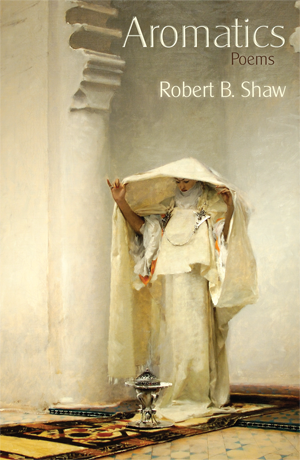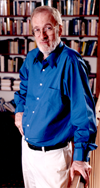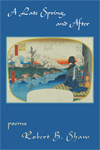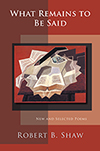Page last updated: January 24, 2022
All pages copyright © 2022 by Pinyon Publishing

AROMATICS
Poems by Robert B. Shaw
The scents that permeate the poems of Aromatics include bittersweet ones of memory, acrid ones of danger, and many others equally enticing or alarming.
Candles—in this enlightened age, who needs them?
Everyone and his mother, it appears.
And what they’re after more than anything
is opportunity to choose aromas.
As in Robert B. Shaw’s previous work, his questing scrutiny of the world’s inner mysteries is revealed in daily concerns and the self-reflection and hope that accompanies it.
Looking through the skylight
a moment after midnight,
I found my gaze returned.
The seven bright eyes burned
with neither love nor hate.
Robert Frost once offered this definition of a successful poem: “Read it a hundred times: it will forever keep its freshness as a metal keeps its fragrance.” The poems in this book aspire to that high standard.
Spring 2013, Winner of the Poet’s Prize, awarded annually by a distinguished panel of poets for the best book of verse published in the previous two years.
Fall 2012, The Meyer POETRY Anthology new 7th Edition has included “Wild Turkeys” from Aromatics
Spring 2012, The largest state book award program, the Massachusetts Center for the Book, awards Aromatics: a Must-Read Book of Poetry
“a brightly scented journey of vivid imagery and lyricism. Whether sparked by the color of a pigeon’s neck feathers or a moment of inspiration during a workout, these poems present the readers with beautiful descriptions of nature, myth, and everyday life.”
“Robert Shaw can do almost anything in verse, and do it well. His structural patterns vary; the range of his subjects is wide, but his New England sensibility is bedrock; unexpected shifts and turns mark many poems. His voice is conversational yet quietly formal, amiably inviting to his reader. Everything, no matter how randomly it may seem to occur, is aimed. His rare and subtle ways of observing the things of this world are also affectionate and welcoming. Aromatics, Shaw’s sixth book of poetry, caps 30 years of work, of saying what he has ‘lived to say.’ It’s a gem.”—DABNEY STUART, Author of Tables
“Undaunted by ‘the heatless fire of time’ (not heartless—heatless), unafraid of the monsters of myth (check the poem about Perseus), and wonderfully allusive, whether comic (how did Rilke get into that gym? see the end of ‘Working Out’ or tragicomic (see the villanelle “Single File,” with its joke against Frost’s ‘Design’), Shaw demonstrates once again his care and craft, his mix of transatlantic, or traditional, elegance and New England honesty, of fluent blank verse and rhyme, attentive to—rather than bound by—the examples of Frost, Auden, Merrill. Here is an unshowy, confident, and often masterful collection: read it and hear it, and you might just find yourself saying, some times, “What a neat effect!” and at others, simply, ‘Life is like that.’”—STEPHEN BURT, professor of English at Harvard, Author of Close Calls with Nonsense


 ROBERT B. SHAW is the author of five previous books of poetry, the latest of which,
Solving for X, won the Hollis Summers Prize. For his recent prose work, Blank Verse:
A Guide to its History and Use, he received the Robert Fitzgerald Award.
ROBERT B. SHAW is the author of five previous books of poetry, the latest of which,
Solving for X, won the Hollis Summers Prize. For his recent prose work, Blank Verse:
A Guide to its History and Use, he received the Robert Fitzgerald Award.
A longtime resident of Massachusetts, Shaw teaches at Mount Holyoke College, where he is the Emily Dickinson Professor of English.
 A Late Spring, and After (2016): Shaw explores the depths of experience, childhood,
memory, and his midwestern roots. The heart of his book is a series of meditations
on his wife’s illness, passing, and what remains after—the vivid memories of time
well-spent. (6"x9" paperback, 112 pages, ISBN: 978-1-936671-38-0, $16.00).
A Late Spring, and After (2016): Shaw explores the depths of experience, childhood,
memory, and his midwestern roots. The heart of his book is a series of meditations
on his wife’s illness, passing, and what remains after—the vivid memories of time
well-spent. (6"x9" paperback, 112 pages, ISBN: 978-1-936671-38-0, $16.00).

 What Remains to Be Said (New and Selected Poems, 2022):A sense of connectedness and
gratitude—as in the opening “Morning Song,” Shaw’s mastery of words also unbinds
us from words, and we enter the dark behind our eyes.
What Remains to Be Said (New and Selected Poems, 2022):A sense of connectedness and
gratitude—as in the opening “Morning Song,” Shaw’s mastery of words also unbinds
us from words, and we enter the dark behind our eyes.
(6"x9" paperback, 328 pages, ISBN: 978-0-9821561-84-7, $25.00).